NATIONAL SECURITY & OCEAN PLANNING BRIEFING ON CAPITOL HILL
Ultra Large Container Vessels four football fields long, offshore wind facilities, endangered whales, the world’s largest naval installation, the Atlantic fleet’s primary military training area — all utilize the same Atlantic coast waters.
On November 8, Representative Seth Moulton (MA 6th District) and Senator Reed (RI) co-sponsored a briefing for Congressional staffers featuring two ocean planners from the Department of Defense and Department of Homeland 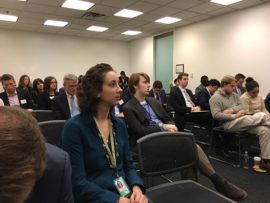 Security — Mr. Joe Atangan, U.S. Navy and Mr. Chris Scraba, U.S. Coast Guard. The focus of the briefing was the critical role regional ocean plans play in national security. Check out the five-minute clip (below) from Ocean Frontiers III, which led the briefing.
Security — Mr. Joe Atangan, U.S. Navy and Mr. Chris Scraba, U.S. Coast Guard. The focus of the briefing was the critical role regional ocean plans play in national security. Check out the five-minute clip (below) from Ocean Frontiers III, which led the briefing.
“The high seas are our workplace”, said Mr. Atangan. “They are our training grounds, and the more activities you have out there, the more opportunities there are for conflict for the use of those spaces.” Mr. Atangan emphasized that communication, coordination and collaboration amongst state, federal, 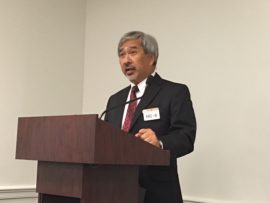 and tribal entities are fostered by the ocean planning process. “This collaboration is key as we move forward — whether you look at growing the global economy, whether you are looking at it for conservation purposes or whether you are looking at it from a national defense perspective.”
and tribal entities are fostered by the ocean planning process. “This collaboration is key as we move forward — whether you look at growing the global economy, whether you are looking at it for conservation purposes or whether you are looking at it from a national defense perspective.”
Mr. Scraba detailed the Coast Guard’s role to facilitate safe navigation and efficient operation of the marine transportation system and to protect key environmental areas. Scraba wrapped up by saying, “Together, in a whole-of-government approach, it is our mutual responsibility to ensure smart 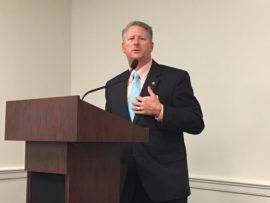 ocean planning is carried out to protect and preserve our oceans for future generations. It is vital to our nation’s national security, economic prosperity, and the ocean’s environment.”
ocean planning is carried out to protect and preserve our oceans for future generations. It is vital to our nation’s national security, economic prosperity, and the ocean’s environment.”
Our sincere thanks to Mr. Scraba and Mr. Atangan for sharing their insights on national security and marine transportation. With a wide range of Congressional offices in attendance, collaborative ocean planning got increased exposure and, hopefully, new allies.
2017 STATE OF THE BEACH REPORT CARD
Surfrider Foundation has released their 2017 State of the Beach Report Card, which evaluates U.S. states and territories on their policies to protect our nation’s beaches from coastal erosion, haphazard development, and sea level rise. The results reveal that 22 out of 30 states, and the territory of Puerto Rico, are performing at adequate to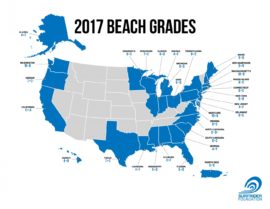 poor levels, with the lowest grades located in regions that are most heavily impacted by extreme weather events.
poor levels, with the lowest grades located in regions that are most heavily impacted by extreme weather events.
Surfrider’s report card clearly denotes that not only do the majority of states need to make improvements, but they also require continued support at the federal level for the Coastal Zone Management Act and funding for agencies such as NOAA, to protect our coastlines for the future.
Read the report / Read the article
TAKE ACTION
Our National Monuments Are At Risk
Despite overwhelming public comment in favor of keeping National Monument protections in place, Interior Secretary Zinke has sent President Trump a report recommending drastic changes to these special public lands and marine resources, including eliminating vast portions of several monuments and allowing mining, logging, drilling, and industrial-scale commercial fishing in these protected areas. TAKE ACTION ON MONUMENTS
Tell Congress to Co-Sponsor the Coastal Communities Ocean Acidification Act
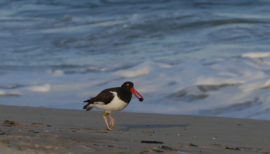 As carbon dioxide pollution continues to increase at alarming rates, our ocean is quickly becoming more acidic than ever before, hurting fish, corals and shellfish. This poses a threat to our fishing and tourism industries, as well as the coastal communities that rely on them. The Coastal Communities Ocean Acidification Act will help us figure out which communities are most at risk and determine what strategies of adaptation can be used to protect them. This legislation needs your voice! TAKE ACTION ON OCEAN ACIDIFICATION
As carbon dioxide pollution continues to increase at alarming rates, our ocean is quickly becoming more acidic than ever before, hurting fish, corals and shellfish. This poses a threat to our fishing and tourism industries, as well as the coastal communities that rely on them. The Coastal Communities Ocean Acidification Act will help us figure out which communities are most at risk and determine what strategies of adaptation can be used to protect them. This legislation needs your voice! TAKE ACTION ON OCEAN ACIDIFICATION
Protect Our Coasts From Offshore Drilling
The Interior Department is forging ahead with a plan to expand offshore drilling. Opening up more of our coasts to drilling is dangerous and short-sighted, as an accident could lead to a massive oil spill causing severe impacts to the economies of coastal communities, marring beaches and shorelines, and injuring or killing birds, fish and marine mammals. Yet the Trump administration has started to develop a five-year program designed to encourage more offshore oil and gas drilling. Tell the Secretary of the Interior not to open new areas of the ocean to risky offshore drilling.
TAKE ACTION ON OFFSHORE DRILLING
SHARE THE OCEAN FRONTIERS SERIES WITH YOUR COMMUNITY

UPCOMING FILM SCREENINGS
Check out our calendar of upcoming film screenings for more information on these dates!
- November 28, 2017 – Annville, PA – Ocean Frontiers III
- January 23, 2018 – Boston, MA – Ocean Frontiers III with panel discussion at the New England Aquarium. Tickets available in early December.
- February 22, 2018 – Ludlow, MA – Ocean Frontiers II
Don’t see a screening near you? Plan one!
OCEAN PLANNING NEWS
Northeast
Keep up with the Northeast Regional Planning Body (RPB) at neoceanplanning.org.
- The Northeast Regional Planning Body had a public workshop and meeting in New Hampshire last week. You can view the briefing packets for both days, along with additional materials, on the RPB’s events page.
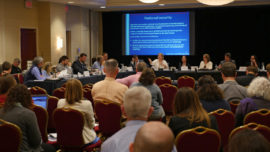 Mid-Atlantic
Mid-Atlantic
The Mid-Atlantic RPB events and updates can be found at www.boem.gov/MidA-New.
• January 24, 2018 – Mid-Atlantic Regional Planning Body meeting at the Environmental Protection Agency in Philadelphia, PA. Open to the public. Registration link coming soon.
West Coast
Keep up with the West Coast RPB’s news and events at www.westcoastmarineplanning.org.
- December 5, 2017 – West Coast Regional Planning Body Annual Meeting in Long Beach, CA. Open to the public. Register to attend in person, or email John Hansen for details on how to attend remotely.
- Washington State – The public is invited to comment on the newly-released draft Marine Spatial Plan for Washington’s Pacific Ocean coast. Submit comments online by December 12, 2017.
Pacific Islands
Learn about the Pacific Islands RPB by visiting pacificislandsrpb.org.
Thanks for all you do for the oceans!

Karen Anspacher-Meyer
Executive Director, Green Fire Productions